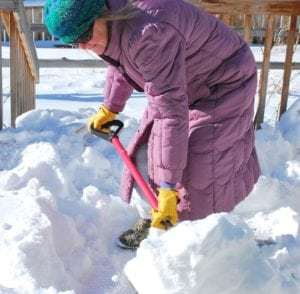Winter wonderlands: as beautiful as they are, they don’t come without a few hazards. Heavy snowstorms, slick ice, and freezing temperatures all make for poor living conditions. Below are some of the most important winter safety tips for seniors. This season, whether you’re a senior yourself or are looking out for your loved ones, there are a few things you’ll want to be aware of.
Winter Safety Tips for Seniors
Hypothermia and frostbite.
Freezing-cold temperatures can take a toll on anyone, but—because their bodies produce less heat—seniors are more prone to frostbite and hypothermia. Keep your home warm, and don’t go outside without dressing for the weather. This means a hat, scarf, warm socks along with winter shoes or boots, gloves, and a few layers under your winter coat.
In the event of hypothermia or frostbite, know the warning signs so you can take action quickly. Symptoms of frostbite are gray-yellow or ashy skin, numbness, and skin that feels waxy or hard. If you believe you have frostbite, soak the frostbitten area in warm—not hot—water.
Hypothermia is more serious. These warning signs are pale, ashy, cold skin; lots of shivering (this alone does not indicate hypothermia); feeling weak, confused, or unusually tired; and a slowed heart rate or slow breathing. Call 911 if you believe you or a loved one has hypothermia.
Injuries from shoveling snow.
Older bodies already work harder than usual when the weather turns cold. Strenuous activities like shoveling snow can make them work even harder, and sometimes lead to injuries. If you have heart problems, trouble balancing, or weaker bones, don’t be afraid to ask someone to shovel snow for you. If your loved one has one of these conditions, take the initiative to clear their driveway and walkway from the snow.
Power outages.
Having no power when the weather is freezing can be scary—and dangerous. Prepare for power outages by making sure you have quick, easy access to flashlights, warm blankets, nonperishable food, and a radio powered by batteries. If you experience a power outage, dress as if you’re going outside—a hat and lots of layers.
Slips and falls.
Between ice and snow, falling is common during winter. This goes for people of any age, but it’s more difficult for seniors’ bodies to recover from a bad spill. To help prevent falling, make sure you’re wearing sturdy, nonslip shoes after a snow or ice storm (if you know a loved one doesn’t have good winter shoes, pick some up for them!). And if you know the roads and sidewalks aren’t clear yet, try to stay indoors until they are.
Sometimes, slips occur indoors—snow or ice stuck to the bottom of your shoes will melt and make floors slick. Take your shoes off right when you go inside so this doesn’t happen.
____
We hope these important winter safety tips for seniors have helped you! If you have an elderly loved one in your life, be sure to check on him or her frequently this season.
Are you looking for an assisted living facility in Tennessee? If so, we hope you will look into Hearthside Senior Living Place. We have two locations—one in Collierville and one soon to open in Bartlett. Our staff would be happy to schedule a tour for you so that you can explore your preferred facility, meet some of the residents, and ask any questions you might have. We look forward to meeting you!

